WINDOWS 8.1 USERS PLEASE NOTE THAT THERE IS NOTHING WRONG WITH THE PDF FILES ON THIS WEBSITE, BUT AN ERROR MESSAGE MAY BE GENERATED BY WINDOWS 8.1 SAYING THAT THE PDF FILE FORMAT IS INCORRECT. IT ISN'T. THE PROBLEM IS WITH THE WINDOWS 8.1 HANDLING OF PDF FILES. THE QUICK CURE IS TO INSTALL THE LATEST VERSION OF ADOBE'S FREE 'READER' PROGRAM IN YOUR BROWSER AS DESCRIBED HERE. ALSO, SQUIRREL MAIL CAN HAVE SEVERE ISSUES WITH WINDOWS 8.1 AND THAT CAN ALSO CREATE PDF DISPLAY PROBLEMS.
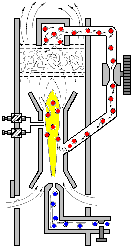 The purpose of this web site is to provide you with an introduction to a series of devices which have been shown to have very interesting properties and some are (incorrectly) described as 'perpetual motion' machines.
The purpose of this web site is to provide you with an introduction to a series of devices which have been shown to have very interesting properties and some are (incorrectly) described as 'perpetual motion' machines.
What's that you say - perpetual motion is impossible? My, you're a difficult one to please. The electrons in the molecules of rock formations have been in rapid motion for millions of years without stopping - at what point will you agree that they are in perpetual motion?
 So, why don't electrons run out of energy and just slow down to a standstill? The universe is a seething cauldron of energy with particles popping into existence and then dropping out again. If the equation E = mC2 is correct, then we can see that a tremendous amount of energy is needed to create any form of matter. Scientists remark that if we could tap even a small part of that energy, then we would have free energy for our lifetime.
So, why don't electrons run out of energy and just slow down to a standstill? The universe is a seething cauldron of energy with particles popping into existence and then dropping out again. If the equation E = mC2 is correct, then we can see that a tremendous amount of energy is needed to create any form of matter. Scientists remark that if we could tap even a small part of that energy, then we would have free energy for our lifetime.
The Law of Conservation of Energy is generally thought to be correct when it states that more energy cannot be taken out of any system than is put into that system. However, that does not mean that we cannot get more energy out of a system than we put into it. A crude example is a solar panel in sunlight. We get electrical power out of the panel but we do not put the sunlight into the panel - the sunlight arrives on its own. This example is simple as we can see the sunlight reaching the solar panel. In passing, it might be remarked that the "Law" of Conservation of Energy has recently been proved to be wrong, however, it wouldn't bother me at all if it were actually right as it assumes a "closed system" which is something that does not exist anywhere in the universe.
If, instead of the solar panel, we had a device which absorbs some of the energy which the universe contains and gives out, say, electrical power, would that be so different? Most people say "yes! - it is impossible!" but this reaction is based on the fact that we cannot see this sea of energy. Should we say that a TV set cannot possibly work because we cannot see a television transmission signal?
 Many people have produced devices and ideas for tapping this energy. The energy is often called "Zero-Point Energy" because it is the energy which would remain if a system has it's temperature lowered to absolute zero. This presentation is introductory information on what has already been achieved in this field: devices which output more power than they require to run. This looks as if they contradict the Law of Conservation of Energy, but they don't, and you can see this when you take the zero-point energy field into account.
Many people have produced devices and ideas for tapping this energy. The energy is often called "Zero-Point Energy" because it is the energy which would remain if a system has it's temperature lowered to absolute zero. This presentation is introductory information on what has already been achieved in this field: devices which output more power than they require to run. This looks as if they contradict the Law of Conservation of Energy, but they don't, and you can see this when you take the zero-point energy field into account.
The material on this web site describes many different devices, with diagrams, photographs, explanations, pointers to web sites, etc. As some of the devices need an understanding of electronic circuitry, a simple, step-by-step instruction course in electronics is also provided in Chapter 12. This can take someone with no previous knowledge of electronics, to the level where they can read, understand, design and build the type of circuits used with these devices.
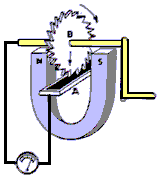 This is a very interesting field and the topic is quite absorbing once you get past the "it has to be impossible" attitude. We were once told that it would be impossible to cycle at more than 15 mph as the wind pressure would prevent the cyclist from breathing. Do you want to stay with that type of 'scientific' expert? Have some fun - discover the facts.
This is a very interesting field and the topic is quite absorbing once you get past the "it has to be impossible" attitude. We were once told that it would be impossible to cycle at more than 15 mph as the wind pressure would prevent the cyclist from breathing. Do you want to stay with that type of 'scientific' expert? Have some fun - discover the facts.
There are many, many interesting devices and ideas already on the web. This site does not mention them all by any means. What it does, is take some of what are in my opinion, the most promising and interesting items, group them by category, and attempt to describe them clearly and without too many technical terms. If you are not familiar with electronics, then some items may be difficult to understand. In that case, I suggest that you start with Chapter 12 and go through it in order, moving at whatever speed suits you, before examining the other sections. I hope you enjoy what you read.

Note: When you have finished reading any of the sections shown below, use the 'Back' button of your browser to return to this page. You will need Version 7.0 or later of the Adobe 'Acrobat' reader to display these sections. It can be downloaded free from:
www.adobe.com
THE MATERIAL PRESENTED ON THIS WEB SITE IS FOR INFORMATION PURPOSES ONLY. SHOULD YOU DECIDE TO PERFORM EXPERIMENTS OR CONSTRUCT ANY DEVICE, YOU DO SO WHOLLY ON YOUR OWN RESPONSIBILITY -- NEITHER THE COMPANY HOSTING THIS WEB SITE, NOR THE SITE DESIGNER ARE IN ANY WAY RESPONSIBLE FOR YOUR ACTIONS OR ANY RESULTING LOSS OR DAMAGE OF ANY DESCRIPTION, SHOULD ANY OCCUR AS A RESULT OF WHAT YOU DO.
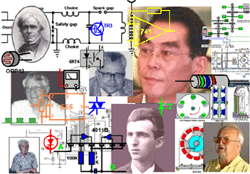 The main information on this web site has been gathered together into a standard book format. You can download the main set of information, including the patents, as an eBook, using this link eBook Release 27.0. The document contains some 2,900 pages and has a file size of about 47 Mb which means that it will take some time to download. Alternatively, you can pick individual chapters as you wish. The eBook has more than 400 Bookmarks to allow easy access to any topic. May I suggest that you store anything you download on your local drive as web sites do not remain in place for ever. The most recent updates to this document are listed here.
The main information on this web site has been gathered together into a standard book format. You can download the main set of information, including the patents, as an eBook, using this link eBook Release 27.0. The document contains some 2,900 pages and has a file size of about 47 Mb which means that it will take some time to download. Alternatively, you can pick individual chapters as you wish. The eBook has more than 400 Bookmarks to allow easy access to any topic. May I suggest that you store anything you download on your local drive as web sites do not remain in place for ever. The most recent updates to this document are listed here.
Note: Some versions of Google's Chrome browser appear to be unable to read the pdf files on this website properly. The result is blank pages after the first page. If that happens to you, then please use Microsoft's Internet Explorer or Mozilla's Firefox browser to download a proper copy, or find the missing chrome plug-in needed.
Contents eBook Index: An explanation of the background followed by a general index, an index of devices and an index of the people and devices mentioned. ePub

Introduction Newcomer's Introduction: A quick guide to what Free-Energy is all about, explaining the basics. HTML ePub
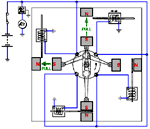 Chapter 1 Magnet Power: The Wang magnet motor, the Ecklin-Brown motor-generator, Howard Johnson's magnet motor, the 'Carousel' magnet motor, Robert Tracy's magnet motor, Ben Teal's electromagnetic motor, the Jines magnet motor, Stephen Kundel's magnet motor, Charles Flynn's magnet motor, the Steorn magnetic device, George Soukup's magnet motor, Dietmar Hohl's magnet motor, the Muammer Yildiz magnet motor patent, Don Kelly's magnet motor patent and Mike Brady's 'Perendev' Magnet Motor. size 1.2 Mb, 18 July 2014 HTML ePub
Chapter 1 Magnet Power: The Wang magnet motor, the Ecklin-Brown motor-generator, Howard Johnson's magnet motor, the 'Carousel' magnet motor, Robert Tracy's magnet motor, Ben Teal's electromagnetic motor, the Jines magnet motor, Stephen Kundel's magnet motor, Charles Flynn's magnet motor, the Steorn magnetic device, George Soukup's magnet motor, Dietmar Hohl's magnet motor, the Muammer Yildiz magnet motor patent, Don Kelly's magnet motor patent and Mike Brady's 'Perendev' Magnet Motor. size 1.2 Mb, 18 July 2014 HTML ePub
 Chapter 2 Moving Pulsed Systems: The Adams motor/generator, the Phemax self-powered motor/generator, Raymond Kromrey's No-drag Generator, Teruo Kawai's motor, James Hardy's self-powered water-jet generator, the Mourier COP=10,000 motor, the RotoVerter, Raoul Hatem's free-energy rotor system, Art Porter's magnetic motor system and raising the efficiency of DC motors.
size 1.5 Mb, 16 Dec 2014 HTML ePub
Chapter 2 Moving Pulsed Systems: The Adams motor/generator, the Phemax self-powered motor/generator, Raymond Kromrey's No-drag Generator, Teruo Kawai's motor, James Hardy's self-powered water-jet generator, the Mourier COP=10,000 motor, the RotoVerter, Raoul Hatem's free-energy rotor system, Art Porter's magnetic motor system and raising the efficiency of DC motors.
size 1.5 Mb, 16 Dec 2014 HTML ePub
 Chapter 3 Motionless Pulsed Systems: Graham Gunderson's Solid-state Electric Generator, Charles Flynn's magnetic power enhancement system, Lawrence Tseung's magnetic frame, Thane Heins' dual toroid magnetic frame, cascaded frames, Clemente Figuera's Motionless Generator, The Barbosa and Leal generators, the Lorrie Matchett motionless generator, the Annis/Eberly Motionless Generator, the Richard Willis COP>1 generator, The motionless generators of Dietmar Kunel, The motionless generator of Valeri Ivanov, the motionless generators of Kelichiro Asaoka, Stephan Leben's self-powered electrical generator, Floyd Sweet's VTA, Ashley Gray's generator, the Pavel Imris optical amplifier, the Meyer-Mace Isotopic Generator, the Colman/Seddon-Gilliespie generator, Don Smith's "Resonance Energy Methods", Nikanor Giannopoulos' dual Tesla Coil arrangement, Joseph Boyd's shielded transformer, the 'Gegene' magnetic plate power amplification, Tariel Kapanadze's self-powered electrical generator, William McFreey's analysis of Kapanadze's designs, and Stan Meyer's Particle Generator patent. size 4.6 Mb, 12 Mar 2015 HTML ePub
Chapter 3 Motionless Pulsed Systems: Graham Gunderson's Solid-state Electric Generator, Charles Flynn's magnetic power enhancement system, Lawrence Tseung's magnetic frame, Thane Heins' dual toroid magnetic frame, cascaded frames, Clemente Figuera's Motionless Generator, The Barbosa and Leal generators, the Lorrie Matchett motionless generator, the Annis/Eberly Motionless Generator, the Richard Willis COP>1 generator, The motionless generators of Dietmar Kunel, The motionless generator of Valeri Ivanov, the motionless generators of Kelichiro Asaoka, Stephan Leben's self-powered electrical generator, Floyd Sweet's VTA, Ashley Gray's generator, the Pavel Imris optical amplifier, the Meyer-Mace Isotopic Generator, the Colman/Seddon-Gilliespie generator, Don Smith's "Resonance Energy Methods", Nikanor Giannopoulos' dual Tesla Coil arrangement, Joseph Boyd's shielded transformer, the 'Gegene' magnetic plate power amplification, Tariel Kapanadze's self-powered electrical generator, William McFreey's analysis of Kapanadze's designs, and Stan Meyer's Particle Generator patent. size 4.6 Mb, 12 Mar 2015 HTML ePub
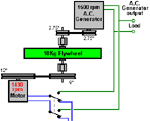 Chapter 4 Gravitational Pulsed Systems: Lawrence Tseung's pulsed wheel, Lawrence Tseung's Impact gravity wheel, Chas Campbell's pulsed flywheel, John Bedini's pulsed flywheel, James Hardy's water-jet generator, the Magnetic Pendulum, Jerzy Zbikowski's Chain Drive, Gravitational Effects, Mikhail Dmitriev's gravity wheel, the Dale Simpson gravity wheel, the Veljko Milkovic pendulum/lever system, Amr Al-Hossary's gravity wheel, the Murilo Luciano gravity chain, The 'Hidro' buoyancy generator, the Renato Ribera buoyancy patent, the Thirty-Kilowatt Gravity-Powered Motor and the Baskara gravity wheel. size 1.4 Mb, 28 July 2014 HTML ePub
Chapter 4 Gravitational Pulsed Systems: Lawrence Tseung's pulsed wheel, Lawrence Tseung's Impact gravity wheel, Chas Campbell's pulsed flywheel, John Bedini's pulsed flywheel, James Hardy's water-jet generator, the Magnetic Pendulum, Jerzy Zbikowski's Chain Drive, Gravitational Effects, Mikhail Dmitriev's gravity wheel, the Dale Simpson gravity wheel, the Veljko Milkovic pendulum/lever system, Amr Al-Hossary's gravity wheel, the Murilo Luciano gravity chain, The 'Hidro' buoyancy generator, the Renato Ribera buoyancy patent, the Thirty-Kilowatt Gravity-Powered Motor and the Baskara gravity wheel. size 1.4 Mb, 28 July 2014 HTML ePub
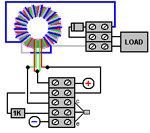 Chapter 5 Energy-Tapping Pulsed Systems: Frank Prentice's electrical power accumulator, Dave Lawton's cold electricity water-splitter cell, John Bedini's pulsed battery charger, the Tesla Switch, the 3-battery switch, Carlos Benitez's self-powered 2 kW generator, Dave Lawton's cold electricity lightbulb, Bob Boyce's COP=12 energy tapping toroid, Don Smith's devices, Vladimir Utkin's explanations of Tesla, Don Smith, Tariel Kapanadze and current amplification, Lawrence Tseung's toroids, The Joule Thief lights of 'LaserSaber', the Ed Gray power tube, Radiant Energy waves, Nikola Tesla's experiments, Don Smith information, the Alberto Molina-Martinez generator, Alfred Hubbard's device, Joseph Cater's device, a Hubbard design, Floyd Sweet's VTA, Rosemary Ainslie's heater design, Joseph H. Cater's self-powered generator and Dr Oleg Gritskevitch's 1.5 MW generator. size 1.8 Mb, 6 June 2014 HTML ePub
Chapter 5 Energy-Tapping Pulsed Systems: Frank Prentice's electrical power accumulator, Dave Lawton's cold electricity water-splitter cell, John Bedini's pulsed battery charger, the Tesla Switch, the 3-battery switch, Carlos Benitez's self-powered 2 kW generator, Dave Lawton's cold electricity lightbulb, Bob Boyce's COP=12 energy tapping toroid, Don Smith's devices, Vladimir Utkin's explanations of Tesla, Don Smith, Tariel Kapanadze and current amplification, Lawrence Tseung's toroids, The Joule Thief lights of 'LaserSaber', the Ed Gray power tube, Radiant Energy waves, Nikola Tesla's experiments, Don Smith information, the Alberto Molina-Martinez generator, Alfred Hubbard's device, Joseph Cater's device, a Hubbard design, Floyd Sweet's VTA, Rosemary Ainslie's heater design, Joseph H. Cater's self-powered generator and Dr Oleg Gritskevitch's 1.5 MW generator. size 1.8 Mb, 6 June 2014 HTML ePub

Chapter 6 Battery-Charging Pulsed Systems: John Bedini's pulsed systems, Roger Andrews' switching system, Ronald Knight's battery information, Ron Pugh's battery charger build, a self-charging battery pulser, the fan pulse charger, the automotive pulse charger, the self-charging motor, the Alexkor battery charger, Howerd Halay's battery conditioning technique, the one-battery pulse charger, the Tesla Switch, Ossie Callanan's COP>1 charging system, the self-charging motor and Stubblefield's water battery.
size 1.2 Mb, 28 Mar 2015 HTML ePub

Chapter 7 Aerial Systems and Electrostatic Generators: Nikola Tesla's system, Thomas Henry Moray's system, Moray King's circuit suggestions, Hermann Plauson's systems, Roy Meyer's device, Raymond Phillips' RF to DC aerial system, the 'Alexkor' aerial system, Dragan Kljajic's printed circuit, the TREC aerial , Harold Deyo's patent application, Charles Goldie's Electrostatic Generator, D. Le May's Electrostatic Generator and Onezime Breaux's Electrostatic Generator.
size 1.4 Mb, 18 June 2014 HTML ePub
 Chapter 8 Fuel-less Engines: The energy in air, Bob Teal's compressed air engine, Scott Robertson's thoughts on putting low-pressure air into a tank of high-pressure air, the Leroy Rogers compressed-air vehicle engine adaption, the Vortex Tube, the Eber Van Valkinberg compressed fluids engine, the Clem engine, Vortex analysis by Prof. Evert, the Josef Papp engine, the Robert Britt engine, the Michael Eskeli turbines, the water-jet generator and the Cahill / Scott generator.
size 670 Kb, 25 May 2013 HTML ePub
Chapter 8 Fuel-less Engines: The energy in air, Bob Teal's compressed air engine, Scott Robertson's thoughts on putting low-pressure air into a tank of high-pressure air, the Leroy Rogers compressed-air vehicle engine adaption, the Vortex Tube, the Eber Van Valkinberg compressed fluids engine, the Clem engine, Vortex analysis by Prof. Evert, the Josef Papp engine, the Robert Britt engine, the Michael Eskeli turbines, the water-jet generator and the Cahill / Scott generator.
size 670 Kb, 25 May 2013 HTML ePub
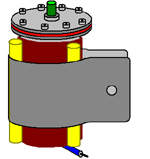
Chapter 9 Passive Systems: Hans Coler's device, Thomas Trawoeger's pyramid, Karel Drbal's pyramid, James Brock's pyramids, Verne Cameron's pyramid transmission technique, the Pancake coil, Peter Grandic's patent, Les Brown's pyramid information, Joseph Cater's explanation of how all pyramids work, Pier Ighina's passive energy devices, the Joe Cell, Bill Williams' design and recent analytical advances, co-ax cable electrets, and Joseph H. Cater's free-energy box. size 1.0 Mb 5 June 2014 HTML ePub
 Chapter 10 Vehicle Systems: The HydroStar and HydroGen designs, running an engine on water alone, Hydroxy Boosters, electrolyser design, the 'Hogg' electrolyser, Pulse Width Modulation current control, Dave Lawton's replication of Stan Meyer's Water Fuel Cell water-splitter, Dave Lawton's circuits and construction details, pipe-tuning details, Dr Cramton's low-power water-splitting, modifying generators to run on HHO alone, David Quirey's system for running unmodified generators on HHO, Stan Meyer's water injection system, Peter Lowrie's hydroxy system, mpg improvement through cam timing, the Firestorm spark plug, Ted Ewert's Vortex Turbine, Water Vapour Injection systems, the Ram Implosion Wing, Fuelsavers, high mpg carburettors, Vortex fuel reformers and the weird nature of water and Advanced Electrolysis.
size 3.4 Mb, 27 Oct 2014 HTML ePub
Chapter 10 Vehicle Systems: The HydroStar and HydroGen designs, running an engine on water alone, Hydroxy Boosters, electrolyser design, the 'Hogg' electrolyser, Pulse Width Modulation current control, Dave Lawton's replication of Stan Meyer's Water Fuel Cell water-splitter, Dave Lawton's circuits and construction details, pipe-tuning details, Dr Cramton's low-power water-splitting, modifying generators to run on HHO alone, David Quirey's system for running unmodified generators on HHO, Stan Meyer's water injection system, Peter Lowrie's hydroxy system, mpg improvement through cam timing, the Firestorm spark plug, Ted Ewert's Vortex Turbine, Water Vapour Injection systems, the Ram Implosion Wing, Fuelsavers, high mpg carburettors, Vortex fuel reformers and the weird nature of water and Advanced Electrolysis.
size 3.4 Mb, 27 Oct 2014 HTML ePub
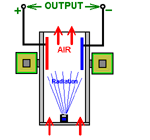 Chapter 11 Other Devices: Nikola Tesla's power from air system, Dr. Harold Apsden's Electrical Power Generating Apparatus patent, Our Energy Future, Paulo and Alexandra Correa's conversion of Longitudinal Electromagnetic Waves to ordinary electricity, Prof. Constantin Meyl's scalar wave information, Nikola Tesla's MHD device, the effects of the Zero-Point Energy field, John R. R, Searle's self-powered garvitational device, construction details for Dave Lawton's gravity wave detector, the Butch Lafonte motor/generator, the Joseph Newman motor, the differences between Maxwell and Heaviside, Daniel Cook's electrical generator, Michael Eskeli's work-free heater design, Karl Schapeller's Device, Condensation-induced water hammer, William Hyde's COP=10 electrostatic power generator, the suppression of knowledge, Bob Beck's medical information and Joseph Cater's scientific information. size 2.5 Mb, 24 Dec 2014 HTML ePub
Chapter 11 Other Devices: Nikola Tesla's power from air system, Dr. Harold Apsden's Electrical Power Generating Apparatus patent, Our Energy Future, Paulo and Alexandra Correa's conversion of Longitudinal Electromagnetic Waves to ordinary electricity, Prof. Constantin Meyl's scalar wave information, Nikola Tesla's MHD device, the effects of the Zero-Point Energy field, John R. R, Searle's self-powered garvitational device, construction details for Dave Lawton's gravity wave detector, the Butch Lafonte motor/generator, the Joseph Newman motor, the differences between Maxwell and Heaviside, Daniel Cook's electrical generator, Michael Eskeli's work-free heater design, Karl Schapeller's Device, Condensation-induced water hammer, William Hyde's COP=10 electrostatic power generator, the suppression of knowledge, Bob Beck's medical information and Joseph Cater's scientific information. size 2.5 Mb, 24 Dec 2014 HTML ePub
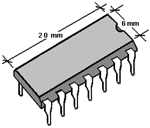 Chapter 12 Electronics Tutorial: Simple descriptions of Voltage, resistors, capacitors, current flow, multimeters, transistor circuits, sensor systems, relays, diodes, transistor testing circuits, Power Supply Units, AC, DC, rectification, the SCR, the triac, the opto-isolator, LEDs, chokes, transformers, the Schmitt Trigger, solenoids, RF detection, coil impedance, the diode bridge, multivibrators, inverters, truth tables, the 7414 chip, NAND gates, latches, bistables, gating, the 4093 chip, prototype construction, the 4011, the Darlington pair, using a gate as an amplifier, the 555 chip, the 741 chip, op-amps and comparators, a simple, versatile, Schmitt inverter signal generator, the CD4022BC chip, the CD4017B with divide-by-25 example, programming the PIC chip, capacitors, AC current in coils, resonance, constructing prototypes, test equipment and how to build it, and 'the weird stuff'. size 1.0 Mb, 25 Oct 2013 HTML ePub
Chapter 12 Electronics Tutorial: Simple descriptions of Voltage, resistors, capacitors, current flow, multimeters, transistor circuits, sensor systems, relays, diodes, transistor testing circuits, Power Supply Units, AC, DC, rectification, the SCR, the triac, the opto-isolator, LEDs, chokes, transformers, the Schmitt Trigger, solenoids, RF detection, coil impedance, the diode bridge, multivibrators, inverters, truth tables, the 7414 chip, NAND gates, latches, bistables, gating, the 4093 chip, prototype construction, the 4011, the Darlington pair, using a gate as an amplifier, the 555 chip, the 741 chip, op-amps and comparators, a simple, versatile, Schmitt inverter signal generator, the CD4022BC chip, the CD4017B with divide-by-25 example, programming the PIC chip, capacitors, AC current in coils, resonance, constructing prototypes, test equipment and how to build it, and 'the weird stuff'. size 1.0 Mb, 25 Oct 2013 HTML ePub
 Chapter 13 Doubtful Devices: Paul Baumann's Thestatika, Michael Faraday's Homopolar Generator (or the N-Machine), the Borderland Science AC version of the N-machine, Nikola Tesla's double Homopolar machine, the Romag and Mini-Romag, Cold Fusion, Moller's Atomic Hydrogen Generator, Muammer Yildiz's 'Ocean Star' electrical generator, Jesse McQueen's 'Internal Energy-generating Power Source', the 'D18' Nitro Cell, the HydroStar and HydroGen systems, Hydrogen from Aluminium, Francois Cornish's system, Ultrasonic Water-splitting, Tom Bearden's Motionless Electromagnetic Generator, Dave Lawton's assymetric MEG and Valeri Ivanov's Motionless Generator. size 1.0 Mb, 7 June 2014 HTML ePub
Chapter 13 Doubtful Devices: Paul Baumann's Thestatika, Michael Faraday's Homopolar Generator (or the N-Machine), the Borderland Science AC version of the N-machine, Nikola Tesla's double Homopolar machine, the Romag and Mini-Romag, Cold Fusion, Moller's Atomic Hydrogen Generator, Muammer Yildiz's 'Ocean Star' electrical generator, Jesse McQueen's 'Internal Energy-generating Power Source', the 'D18' Nitro Cell, the HydroStar and HydroGen systems, Hydrogen from Aluminium, Francois Cornish's system, Ultrasonic Water-splitting, Tom Bearden's Motionless Electromagnetic Generator, Dave Lawton's assymetric MEG and Valeri Ivanov's Motionless Generator. size 1.0 Mb, 7 June 2014 HTML ePub
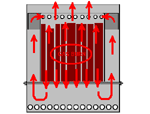 Chapter 14 Renewable-Energy Devices: Efficient solid-fuel burners, Stan Meyer's hydroxy gas burner system, the Kim heaters, the Eugene Frenette heater, the Eugene Perkins heater, the multi-disc heater, the Peter Davey heater, the Jean-Christophe Dumas heater, the simple home-build windmill design from Dan Bartmann and Dan Fink, William McDavid's wind or water generator, Frank Herbert's high-efficiency windmill, the 'Power Plant for Caravans' from Claude Mead and William Holmes, the easy-build Solar Funnel cooker, water and milk pasteurisation, the Solar Funnel as a Cooler, the Solar Puddle, the 'Easy-Lid Cooker', drinking water systems, solar sills, Elmer Grimes' high-volume drinking water from air, the Chalice Courneya water from air system, Toribio Bellocq's well-pumping system, Richard Dickinson's well-pumping system, Arthur Bentley's well-pumping system, the self-powered Ram Pump, wave power systems, solar icemaking, Einstein's refrigeration through heating, solar panels and low-cost heating.
size 2.7 Mb, 19 Jun 2014 HTML ePub
Chapter 14 Renewable-Energy Devices: Efficient solid-fuel burners, Stan Meyer's hydroxy gas burner system, the Kim heaters, the Eugene Frenette heater, the Eugene Perkins heater, the multi-disc heater, the Peter Davey heater, the Jean-Christophe Dumas heater, the simple home-build windmill design from Dan Bartmann and Dan Fink, William McDavid's wind or water generator, Frank Herbert's high-efficiency windmill, the 'Power Plant for Caravans' from Claude Mead and William Holmes, the easy-build Solar Funnel cooker, water and milk pasteurisation, the Solar Funnel as a Cooler, the Solar Puddle, the 'Easy-Lid Cooker', drinking water systems, solar sills, Elmer Grimes' high-volume drinking water from air, the Chalice Courneya water from air system, Toribio Bellocq's well-pumping system, Richard Dickinson's well-pumping system, Arthur Bentley's well-pumping system, the self-powered Ram Pump, wave power systems, solar icemaking, Einstein's refrigeration through heating, solar panels and low-cost heating.
size 2.7 Mb, 19 Jun 2014 HTML ePub
 Chapter 15 The current situation: why free-energy devices are not yet on sale in your local shop. How to get out of debt: the situation in the UK, the deception of "Joinder", the deception of "Notice", the deception of "Includes", the deception of "Summons", the deception of the "Name", the deception of the "Birth Certificate", the deception of "Registration", the "Government" is actually a company, meet your "strawman", what the police can and can't do, the situation in America, economic hit-men and their actions, the techniques used against you, the resulting consequences, research material and the practical situation and what you can do about it.
size 811 Kb, 4 Jan 2014 HTML ePub
Chapter 15 The current situation: why free-energy devices are not yet on sale in your local shop. How to get out of debt: the situation in the UK, the deception of "Joinder", the deception of "Notice", the deception of "Includes", the deception of "Summons", the deception of the "Name", the deception of the "Birth Certificate", the deception of "Registration", the "Government" is actually a company, meet your "strawman", what the police can and can't do, the situation in America, economic hit-men and their actions, the techniques used against you, the resulting consequences, research material and the practical situation and what you can do about it.
size 811 Kb, 4 Jan 2014 HTML ePub

Chapter 16 A selection of Questions asked by readers and the Answers provided. Topics: What Should I Build? with opinions expressed on more than 90 devices, Electrolysis, Magnet Motors, Don Smith's Devices and General Queries and magnetic heater details.
size 541 Kb, 20 Dec 2014 HTML ePub
The last few updates to the eBook are listed here.
Appendix Part 1 The Appendix is part of the eBook and is normally downloaded with it. However, there have been one or two requests for it to be available as a separate download, so here is Part 1 which is 4 Mb in size HTML
A table of wire sizes, their diameter, current-carrying capacity, frequency limits, etc.
Frank Fecera’s permanent magnet motor patent
Howard Johnson’s permanent magnet motor patent
Harold Ewing’s Carousel permanent magnet-generator patent
The Pavel Imris minimal power lighting system patent
The Colman/Seddon-Gillespie 70-year battery patent
The Jon Sok An Lenz-less electrical generator patent
The Molina Martinez self-powered electrical generator patent
Michael Ognyanov’s solid-state electrical generator patent
Edwin Gray’s electric motor patent
Edwin Gray’s electric power supply patent
The Adams-Aspden electrical motor-generator patent
William Barbat’s self-powered electrical generator patent
John Reardon’s AC generator patent
Geoffrey Spence’s self-powered electrical generator patent
Robert Alexander’s COP = 2.93 electrical generator patent
Shigeaki Hayasaka’s electrical generator patent
Larry Jamison’s electrical generator patent application
Teruo Kawai’s COP>1 electric motor patent
Joseph Newman’s Energy Generator patent
Philip Brody’s very high output ceramic solar devices patent
Charles Flynn’s controlled magnetic devices patent
The Motionless Electromagnetic Generator patent
Dan Davidson’s acoustic-magnetic electrical generator patent
John Bedini’s battery-charging patent
John Bedini’s motor-generator patent and
John Bedini’s pulse-charging system patent.
Appendix Part 2 Size 4 Mb, HTML
Richard Weir and Carl Nelson’s battery replacement patent
Hermann Plauson’s aerial power systems patent
Roy Meyers’ Electricity-producing device patent
Paulo and Alexandra Correa’s free-electricity patent
Paulo and Alexandra Correa’s energy conversion patent
The Mead-Nachamkin ZPE to electricity conversion patent
Stanley Meyer’s Water Fuel patent 4,936,961
Stanley Meyer’s hydrogen injection system for vehicles patent 4,389,981
Stanley Meyer’s hydrogen gas burner patent 4,421,474
Stanley Meyer’s hydrogen generation and enhancement patent 5,149,407
Stanley Meyer’s water fuel generator patent CA 2,067,735
Stanley Meyer’s WFC control circuitry patent WO 92/07861
Stephen Meyer’s water-splitting patent application 2005/0246059
Henry Puharich’s water-splitting patent 4,392,230
Shigeta Hasebe’s spiral electrolyser patent
Stephen Chambers’ hydroxy generator patent (Xogen Power Inc.)
Charles Garrett’s water carburettor patent
Archie Blue’s electrolyser patent
Ruggero Santilli’s plasma arc electrolysis patent
Chak Chang’s low-voltage, low-temperature plasma patent application.
Appendix Part 3 Size 10 Mb, HTML
Juan Aguero’s water-engine patent application
Stephen Horvath’s water-powered car patent
Christopher Eccles’ water-splitting cell patent
Spiro Spiros’ COP>1 electrolyser patent
Henry Paine’s hydroxy gas conversion patent
Boris Volfson’s gravity space-drive patent
Charles Pogue’s first high-mpg carburettor patent
Charles Pogue’s second high-mpg carburettor patent
Charles Pogue’s third high-mpg carburettor patent
Ivor Newberry’s high-mpg carburettor patent
Robert Shelton’s high-mpg carburettor patent
Harold Schwartz’s high-mpg carburettor patent
Oliver Tucker’s high-mpg carburettor patent
Thomas Ogle’s high-mpg carburettor patent
Stephen Kundel’s permanent magnet motor
Charles Flynn’s permanent magnet motor
Claude Mead and William Holmes’ wind power storage system
Richard Willis' COP>>1 electrical generator
Mark McKay's investigation into Edwin Gray's technology
Mike Brady's "Perendev" Magnet Motor patent
Donald Kelly's Magnet Motor patent
Bob Neal's Air Compressor patent
The Leroy Rogers Compressed air engine conversions
Eber Van Valkinburg's Compressed Air engine
Josef Papp's Inert Gas fuel-less engine
Robert Britt's Inert Gas fuel-less engine
Floyd Sweet's "VTA" Electricity Generator theory
Meguer Kalfaian's Electricity Generator
The Annis and Eberly Solid-State Magnetic Flux-Switching System
William McDavid Junior's High-Efficiency Wind-Power Generator
The Barbosa and Leal Self-Powered Generators
The 'Hotsabi' Booster
The 'Smacks' Booster
Dealing with a Vehicle's Computer
Bob Boyce's High Efficiency Electrolyser
Designing High Capacity Electrolysers
The High Power Designs of Donald Smith
A Practical Implementation of Don Smith's Main Design
Constructing High Quality Coils
A Russian Implementation of Don Smith's Main Design
Sergei's 'Dynatron' Circuitry
Rosemary Ainslie's COP=17 Heating Design
Web links to Scientific Papers and videos.
Other free-download eBooks
Scientific Papers
Relevant Patents
Interesting Web Videos
Interesting Web Sites
|

 Practical Guide to Free-Energy Devices
Practical Guide to Free-Energy Devices


 The purpose of this web site is to provide you with an introduction to a series of devices which have been shown to have very interesting properties and some are (incorrectly) described as 'perpetual motion' machines.
The purpose of this web site is to provide you with an introduction to a series of devices which have been shown to have very interesting properties and some are (incorrectly) described as 'perpetual motion' machines. 
